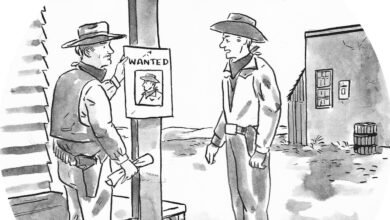The Endless August Recess | The New Yorker

In the dog days of August in Washington, D.C., with Congress off on its district-work period, the House still convenes biweekly pro-forma sessions, in which a handful of straggler representatives assemble in front of an empty chamber. When I watched one unfold on a recent morning, the Speaker pro tempore presided over the customary reading of a prayer and the Pledge of Allegiance, and the legislative day concluded within five minutes. The halls were quiet without Hill reporters waiting to chase lawmakers down; the action had temporarily relocated from the Capitol. After Mike Johnson called for an early start to the House’s August recess, this year, in order to prevent a vote on releasing the Epstein files, he sent Republicans home with the directive to sell the One Big Beautiful Bill Act to their districts. This sometimes took the form of town-hall meetings.
Town halls, which originated in the New England colonies in the seventeenth century, often devolve. In 1795, a Philadelphia town hall held to debate the Jay Treaty ended with attendees throwing rocks; two hundred and thirty years later, angry protesters at the Georgia representative Marjorie Taylor Greene’s town hall were tased and shot with stun guns. This summer, in Nebraska, Representative Mike Flood, one of a handful of Republicans to host a town hall about the “Big Beautiful Bill,” was booed for the duration of his PowerPoint presentation. He tried to recite talking points over shrieks of “Liar!,” and was then asked why he wouldn’t “stand up to fascism” or release the Epstein files. In rural Northern California, Representative Doug LaMalfa was heckled for ninety minutes by six hundred seniors at an Elks Lodge. (“Is this how you get stuff? By yelling?” he asked them.) The forums held in progressive-leaning cities within Republican districts were thankless. In deep-red locations, they could serve as useful self-promotion. Representative Nancy Mace, of South Carolina, went on a “Mother of All Town Halls” tour as the branded launch for her gubernatorial campaign, pitching herself as “Trump in heels” and inviting protesters to debate her, presumably to generate footage that could be clipped into campaign-ad videos. The Michigan representative Lisa McClain, the chairwoman of the House G.O.P., embarked on a “Big Beautiful Tour,” a series of choreographed appearances—wearing protective eyeglasses on the floor of a manufacturing plant before retiring to a diner stop, and the like. She brushed off concerns about being tasked with promoting what polls show is unpopular legislation. “It’s always easier to find something wrong with something than it is to find something right,” she told the Washington Post. “You know, I can be lying on a beach and I can be complaining because it’s too windy. I’m still lying on a beach.”
Earlier this month, Harriet Hageman, a conservative congresswoman from Wyoming, invited her constituents to a town hall at the National Museum of Military Vehicles, in Dubois, to hear about what she’d achieved in Washington. The meeting was held in a squat building in the middle of the sagebrush-steppe landscape. Outside, it looked more like a graveyard—old vehicles and parts scattered everywhere, including the skeleton of a Soviet fighter jet. Visitors wandered through an assortment of historic tanks spread across a rock basin. After pulling up near a historic war ambulance, I passed a parking area for motorized scooters and a display of rifles and bayonets on my way into the town hall. Five sheriffs manned the door. Several dozen people sat at folding tables facing Hageman’s lectern; a woman in the row ahead of me fiddled with military action figures.
Hageman was elected in 2022 as a Trump-backed primary challenger to Liz Cheney, who lost her seat after voting to impeach the President and serving as the vice-chair of the House January 6th committee. Hageman is the state’s sole congressperson. The location of the event was a reminder of the range of constituents she represents in Washington—Dubois is the next mountain town over from the billionaire wilderness of Jackson Hole, where people stand to benefit enormously from the bill’s tax cuts, and it sits just beyond the border of the Wind River reservation, the seventh largest in the nation, where residents rely heavily on federal assistance. On the day of my visit, the New York Times featured a travel guide for thirty-six hours in Jackson Hole, which is in the country’s richest county; an independent Wyoming newspaper ran a story on the effect that the bill’s Medicaid cuts would have on rural health. (Mike Johnson happened to be outside Jackson Hole, taking a gondola from Teton Village to a fund-raiser he was hosting at a mountaintop bistro.)
When Hageman arrived, she launched into remarks about the GENIUS Act—legislation recently passed to regulate stablecoins—reading aloud from a packet about the importance of the dollar continuing to be the world’s reserve currency. At least a few people looked at one another as if to ask, What is she talking about? Eventually, Hageman inched her way to the topic of the “Big Beautiful Bill.” Much of what they’d heard was likely to be “just fearmongering,” she told them. “It’s incredibly complicated.” There was ambient tension in the room when she opened up the floor to constituents. A woman who introduced herself as a veteran approached the mike. “When I was in the military, I took an oath to uphold the Constitution and insure that I follow the Constitution,” she said. She was worried about the funds cut from PBS—the only radio she can get in her rural area is public broadcasting. (The Rescissions Act of 2025, which the House passed in June, rescinded billions in previously approved funding, including for foreign aid and public broadcasting.) “I’m concerned that some of the reasons the funding has been cut is because we’re trying to stop the narrative that may be in conflict with the current agenda of our politicians,” the woman said “What are you doing to insure that we are upholding our First Amendment rights of freedom of speech?” Hageman responded, “You don’t have the First Amendment right to federal funds.” A woman waiting in line to ask a question, wearing a “Liberté et Égalité” T-shirt, shook her head as Hageman complained about how NPR had ignored the Hunter Biden laptop story.
A man named Clint raised his hand to ask about veterans’ services. He had run out of medication two months ago, which typically comes to him, via mail, from the Department of Veterans Affairs. Hageman pointed out three of her staff members who could help with opening a case file for any constituent having an issue with the federal government. They could give him a business card for a man in her office named Nicholas.
“Have you spoken with Nicholas?” she asked.
“Yes, ma’am, last year,” he said.
“O.K., why don’t you get back in touch with Nicholas,” she replied.
A woman who introduced herself as a Northern Arapaho from the Wind River asked about a former uranium-processing facility on the reservation. “I live about a mile away from the site where they processed uranium,” she said. “They did not think about our people that lived there. I’m a double breast-cancer survivor that had a double mastectomy, because I live so close to that plant, and I look at all my relatives in that land surrounding it, and they are all passing away from cancer,” she said. (The site left massive amounts of radioactive tailings, and, after a flood in 2010 contaminated the groundwater, a 2013 tribal epidemiological study showed that four in ten Wind River reservation residents had had a family member die from cancer.) “The only care that we come under is the clinic in Arapahoe and the surrounding Indian clinics, and they’re getting really cut back. Also, a lot of our elder people don’t seek treatment when they get their cancer diagnosis because they think it’s a drain on the economy.”
“Let’s get ahold of my office,” Hageman responded.
The questions that followed toggled from personal logistics to concerns about the future of democracy. Why had Congress abdicated its power to set tariffs? Is it going to be seven dollars for a coffee? Do you believe in due process? Why is online-trading fraud not being taken seriously by the F.B.I.? What are you going to do about property damage from deer being hit by cars? “It’s part of the process of being a constitutional republic,” Hageman told me, of the whole thing, afterward. She seemed a little perturbed to meet a reporter in the receiving line, but also somewhat touched that I had come to see her event in person. “There was discourse. It was civil,” one attendee told me. Another said, “It was bullshit. She’s a liar. She deflected everything.” The latter constituent, who had driven several hours for the event, told me he was certain that the non-critical questions were scripted and prepared in advance. Nearby, a man in a black MAGA hat, named Alfred, told me that the critical questions were just “opinions on false premises.” He was waiting to ask Hageman’s staff if there was something he could pray about on the congresswoman’s behalf. He went on, “I haven’t watched the news since the Carter Administration. I’ve been questioning everything since then. I can’t even watch sports anymore because of the bullshit with the kneeling. There are a lot of people against Trump still, and it drives me crazy. I can’t even watch commercials anymore because they’re so biased.”



